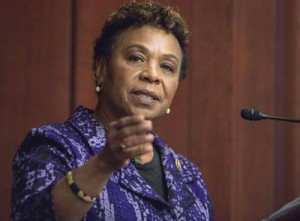

Rep. Barbara Lee and Black AIDS Institute host forum on fighting HIV/AIDS in the Trump era
Submitted by Black AIDS Institute
HIV/AIDS advocates, educators and faith-based leaders weighed in on the current fight against HIV/AIDS in the Trump era during a health forum at the Congressional Black Caucus Foundation Annual Legislative Conference, which was held Sept. 20-24, 2017, in Washington, D.C. Phill Wilson, the president and CEO of the Black AIDS Institute, moderated the forum, which was presented by Rep. Barbara Lee (D-Calif.).
The first panel, which focused on the Affordable Care Act, included James Hildreth, president and CEO of Meharry Medical College; Gabriel Maldonado, executive director and CEO of TruEvolution; Jesse Milan Jr., president and CEO of AIDS United; Shanell McGoy, Ph.D., director of HIV/STD at the Tennessee Department of Health; and Linda Scruggs, acting director of the leadership pipeline at NMAC (formerly the National Minority AIDS Council).
Rep. Lee said that she was proud to have worked alongside President Barack Obama to reauthorize PEPFAR and develop the National HIV/AIDS Strategy.
“Under the Obama administration, we made substantial progress both domestically and internationally in the fight against HIV/AIDS,” said Lee. “In 2010 we worked with President Obama to finally lift the discriminatory HIV travel ban, and we brought back the International AIDS Conference to the United States for the first time in 22 years. Additionally, the passage of the Affordable Care Act [ACA]—and Medicaid expansion in particular—has dramatically expanded and improved healthcare options for many Americans living with the virus.”
Lee continued: “We should build on this progress to ensure all people—no matter where they live—can access lifesaving HIV prevention, care and treatment.” She said that people living with HIV/AIDS (PLWHA) still face incredible challenges when accessing quality health care; she added that she was deeply concerned about the implications of Affordable Care Act repeal on PLWHA—particularly those who rely on Medicaid and Medicaid expansion for care.
“While I’m pleased that we have defeated ACA-repeal efforts for now, we must remain vigilant against any renewed efforts from Republicans to end health care for millions,” Lee said. She emphasized that the Trump administration’s proposed budget would disinvest from many of the HIV/AIDS programs that advocates and community stake holders fought so hard to create and fund.
Lee noted that before Donald Trump became president, the U.S. contributed over 60 percent of the funds for global HIV research.
“Under our current president’s budget, that research will be severely limited or stop altogether. Draconian cuts to programs like Ryan White and the Minority AIDS Initiative would reverse decades of progress and cripple our ability to end AIDS,” Lee said. “And this will not just affect our communities in the U.S.; this budget will have global consequences on public health.”
Because of the uncertainty surrounding domestic and global health policy created by the Trump administration, Cornelius Baker, chief policy advisor in the State Department’s Office of the U.S. Global AIDS Coordinator and Health Diplomacy and an adjunct lecturer at the Emory University Rollins School of Public Health, said that the response of faith-based communities to the AIDS epidemic is even more critical.
“The faith response has been essential since the beginning of the epidemic,” said Baker, who shared his thoughts on the panel about faith communities in the global HIV fight. The panel also included Gloria Crowell, executive director of Allen Temple Health & Social Services; Marsha Martin, director of the Global Network of Black People Working in HIV; and the Rev. Edwin Sanders II, the senior servant and founder of Metropolitan Interdenominational Church.
Crowell said that Allen Temple Baptist Church leaders were very supportive of having an AIDS ministry and started one 30 years ago.
“No one really wants to talk about HIV. It’s not sexy, people are dying and it’s very expensive . . . it’s resource-driven to get people what they need and to continually give people what they need,” said Crowell.
Crowell said that Allen Temple helped to get medications to PLWHA in Zimbabwe during the early 2000s when that country’s own government was slow to react to the growing HIV/AIDS crisis there.
“Within the faith tradition in the Black community, we go to that institution for safe space for education . . . for understanding what we should do next—that’s the case across the diaspora. We are people attached to faith traditions and faith communities,” said Martin. “It is critically important in our family discussions that we begin to think about how we are messaging about HIV/AIDS in our faith institutions.”
Sanders said that faith communities have to get to a point where they understand that conversations about HIV/AIDS, faith and sexuality have to move to the next level.
“Part of moving to the next level is coming to the place where we deal with how to think versus what to think,” said Sanders.
Sanders added that one of the most important experiences that he’s had in dealing with HIV/AIDS happened during a conference hosted by the National AIDS Education and Services for Minorities, a group that builds a community of Black gay men to eliminate HIV and other health conditions that disproportionately affect our community.
When he finished speaking, four young men approached him; after a brief conversation, the young men asked Sanders if he was gay.
“I told my wife and my congregation when I got home that it had to be the highest compliment I’ve been paid in recent years,” Sanders said.
He continued: “You have to be bold enough to put yourself in a position to deal with being challenged in that way. Why? Because in too many instances, what ends up being the greatest fear is being stigmatized in a fashion that makes people look at you in a way that discredits what you have to say.” Activists and community stake holders can’t let the important conversations that must take place in order to address the AIDS epidemic happen only in the vacuum of focus groups, Sanders explained.
Some of the panelists disagreed over the need to test everyone versus using limited resources to test and target the most at-risk populations. Wilson said that, in some situations, it makes sense to test everyone, while in other cases, targeting specific populations works better. “We have different epidemics both domestically and globally, and we have all of these new tools,” said Wilson. “We have surveillance tools that allow us to identify hot spots in the epidemic within zip codes and census tracts.”
Wilson said that health-care professionals and HIV/AIDS advocates must respond to the many facets of the different epidemics in the Black community and engage folks in that way. Baker said that more faith coalitions have to come together and speak about the AIDS epidemic with a clear and articulate voice.
“We have a really big congressional election [next] year, and many people have announced that they won’t seek re-election,” Baker said. “That means that institutional memory and commitment to HIV/AIDS is walking out the door.”
Lee said that it was important for people to know that despite the Trump administration’s attempts to sink the health insurance markets and the Republican Congress’ proposals to repeal it, the Affordable Care Act is still the law of the land. “The resources, rights and health care that the ACA provides are still available to you, and I implore you to sign up if you have not already,” Lee said.
She continued: “Black Americans, especially those living with HIV/AIDS, must come together to fight the Trump administration’s attack on our communities. For decades, we have known that the fight for equality is as urgent as ever, and African Americans living with HIV/AIDS know all too well how a lack of resources and lack of care can devastate our communities. Now more than ever, we must resist and organize to protect our rights, our health care and our progress.”
Freddie Allen is the senior Washington correspondent for Black Press of America and a frequent contributor to the Black AIDS Weekly. You can follow him on Twitter.




Be the first to comment